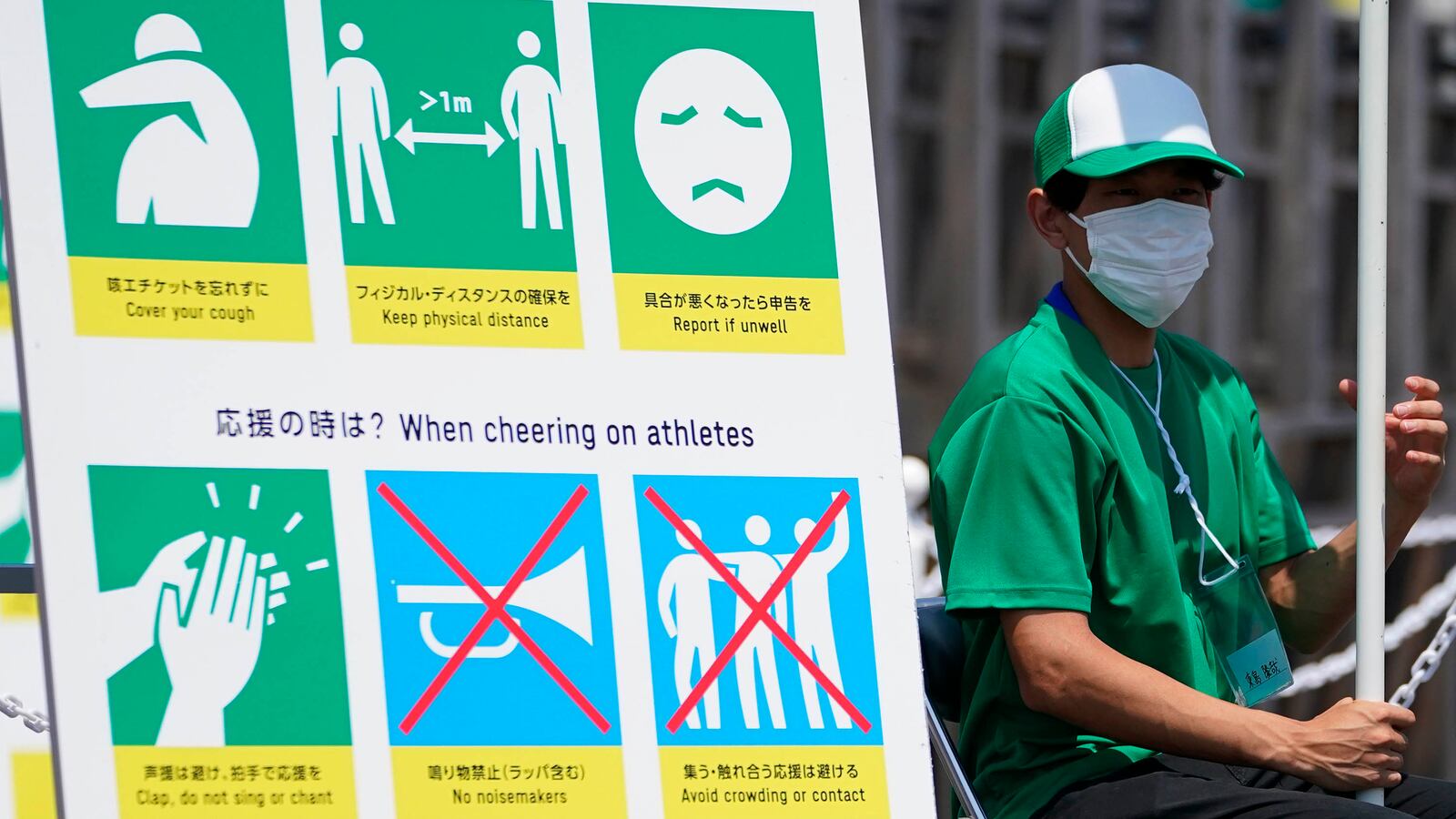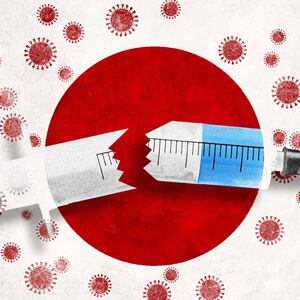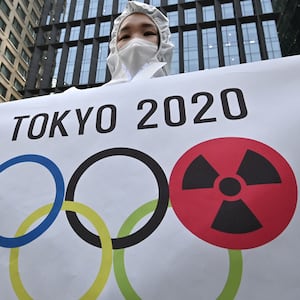TOKYO—Japan is heading into the Olympics in three days with most volunteers and staff only partially vaccinated, and very few fully vaccinated against the novel coronavirus. As it turns out, Tokyo is actually deliberately delaying the vaccination of city workers who are involved in the Games.
In June, Tokyo quietly sent out a missive asking workers to delay their second shot until after the Olympics. Why keep volunteers from getting fully vaccinated? Because “doses received during the Games, and potential fevers caused by side effects to the second dosage could hinder operations supporting the Olympics,” read an email from The Bureau of Olympic and Paralympic Games Tokyo 2020 Preparation, sent to the inboxes of Tokyo 2020 staff members last month.
The first half of the message, sent on June 22 and titled “business announcement,” informed city employees of their eligibility to receive the Moderna vaccine at Tsukiji’s inoculation site as “Olympic personnel” from June 28 to June 30. The second half was a request for workers to delay receiving their second dose until after the Games had concluded, which the metropolitan government would provide from Aug. 10 to Aug. 12. This extended the period between the needed doses from the recommended four weeks, to six weeks.
By slowing down the shots, Tokyo is essentially turning Olympic workers into a swarm of walking superspreaders. The first wave of infections has already broken out in the Olympic Village, with over 71 people testing positive. COVID-19 numbers in Tokyo are averaging over a thousand per day. The chief executive of the Tokyo Olympics Organizing Committee conceded Tuesday that they still might have to cancel the Games entirely.
The Olympic Preparation Bureau resembles the much larger Tokyo Olympic Organizing Committee in its high-handed treatment of personnel. Volunteers face unreasonable demands, and are in short supply. One lawyer was consulted by a volunteer who was allegedly told they had to work from 9 a.m. to 10 p.m. each day with only one hour for lunch. The lawyer informed the staffer that they did not have to work a 13-hour shift, and that they could go home whenever they damn well felt like it. In another blow to volunteer morale, temporary staffing agencies are hiring people to do the same work as volunteers at up to $25 an hour.
The Olympics have bled volunteer staff in droves as COVID-19 numbers rise, and scandal after scandal comes to light. The sexist statements by former Olympic top dog Yoshiro Mori, who later resigned, alienated many. And last week, it was reported that Keigo Oyamada, who was selected to compose the music for the Opening Ceremony, had tortured disabled children in his youth and bragged about it as an adult, sparking outrage.
When the first safety protocols for the Olympics were released, the lack of attention to the welfare of the volunteers resulted in a mass exodus. Tokyo originally had no plans to vaccinate them, or test them regularly, and was only willing to offer them hand sanitizer. The volunteers were even expected to bring their own masks. By early June, 10,000 of the 80,000 registered volunteers for the events had quit.
The decision to vaccinate them has been viewed as a band-aid approach to stem the massive bleeding of unpaid labor. The International Olympic Committee and the Tokyo Organizing Committee need bodies for these Olympics to work, and there simply aren’t enough of them.
Now, the Tokyo government has had to pick up the slack, going so far as to caution workers against getting fully vaccinated, all in an effort to keep them from taking time off to recover from the side effects of a second dose, which are usually more severe than the first round.
A representative from the preparation bureau told The Daily Beast that side effects from the final dose were not the only factor that motivated this recommendation.
“The shifts were packed. If a particular time slot overlapped with a vaccination appointment, it would punch holes into the schedule and disrupt the workflow,” he said. “The Ministry of Health, Labor and Welfare has set the optimum time for a Moderna receiver to schedule their final dose at four weeks after their first one. However, the ministry has not set a cap for how long the inter-dose period can be. Our decision to request Olympic personnel to delay their final dose was based on this information.” The representative said the bureau consulted the Tokyo Bureau of Social Welfare and Public Health prior to sending the June 22 email.
Although there are currently no definitive conclusions on the impact of a delayed second dose to the final acquired immunity, experts highly recommend patients in a two-shot regime to stick to the timeline given by the manufacturers.
Paul Bieniasz, a retrovirologist at the Rockefeller University, told Scientific American that prolonged periods of half-vaccination can carry risks of fueling the birth of new coronavirus variants. Margaret Liu, board chair of the International Society for Vaccines, told verywell health, a medically reviewed U.S. health website, that this is especially the case in environments where people don’t follow proper social distancing and masking guidelines.
Over a year and a half has passed since the first COVID-19 cases were recorded in China. Since then, the virus has mutated to evade the antibodies developed in the human population. Any allowance given for some portion of the virus to survive your body’s defenses can nurture a new variant that is immune to existing treatments.
Naoto Ueyama, chair of the Japan Doctors Union, confirmed to The Daily Beast these risks exist and that Olympic personnel who aren’t immune to the virus are a danger to everyone, including athletes.
“The isolation bubble doesn’t work, and as infection spreads, there is a greater chance that a new variant will be born,” he said. “A vaccination delay like this is not something the city should request.”




